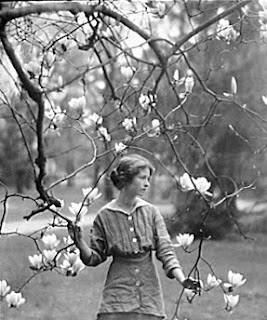Johnny Cash and The "Renascence" of Edna Millay
If you look at history, feminism has never died off, it just keeps having a renascence. There is so much in a name and Edna St Vincent Millay was as much her name as she was her beliefs. In the photographs I've seen of her, Edna was an extraordinarily beautiful woman. However, let me take that back. Not the extraordinary part or the beautiful or the woman part, the Edna part. She called herself Vincent and people deserve to be called what they want to be called. Vincent, from the photographs I've seen, was an extraordinary and beautiful woman both separately and together as words. Yet her words may have been far more beautiful. She could weave a tale that could draw your attention, pull your imagination into it and leave your mind at peace. All the while, the story Vincent wove might stick with you longer than you would've imagined before you started the piece.
Vincent was born Edna St Vincent Millay, her middle name a testament to the hospital that had saved her uncle's life not long before her birth. By the time Vincent was 12 years old, her mother decided to divorce her father and she and her two sisters moved about the country impoverished by their situation, but were blessed beyond their means in classical literature. When they finally settled down, Vincent began to write and from the onset she was famous. First within her school as she published in the school magazine, later she would win awards on a higher platform, then she was published in a popular children's magazine at the time. Next came the poem that would give her the notoriety that she deserved, "Renascence". The word renascence is the rebirth of something that's been dormant for a time. I won't talk more about the piece, but if you're interested, it's far better than this blog entry. I wouldn't blame you for stopping here and looking it up.
From the time Vincent was in high school up until later years in her life, she was interested in women. By the time she had graduated from Vassar College and starting to establish herself as a New York City literary artist, she made it openly known that she was bisexual. Just a few years late she'd publish a collection of works called 'A Few Figs From Thistles' that explored female sexuality and feminism. It was highly controversial, but also helped her gain more notoriety.
At the height of her notoriety, Vincent wrote her Pulitzer Prize winning poem, "The Ballad of the Harp Weaver". The poem is so visceral, so real, yet impossible. But when you're done, the reality of its impossibility is actually embedded into the part of you that understands a mother's love.
Eighteen years before the legendary feminist poet Vincent Millay died, Johnny Cash was born. Both Vincent and Cash shared the experience of poverty at a young age and both used performances of written word to escape poverty's renascence forever. Both lived through enough economic struggle to express it in ways that stick with us. Both struggled with love and rejection for who they were. Both developed pen names to further there artistic works and both understood the power of a mother's love. "The Ballad of a Harp Weaver" is about the depths of a mother's love. Both Johnny and Vincent recorded themselves reciting this beautiful poem. I like to believe that Johnny may have been trying to give poetry and Edna St Vincent Millay a 'renascence' with his performance. And for my personal sake, I hope poetry has a renascence once again after I'm able to publish 'The Pod', a story told in prose about whales facing adversity on a journey to find higher meaning in life.
Here Johnny Cash pays homage to Vincent and her piece, "The Ballad of the Harp Weaver":

